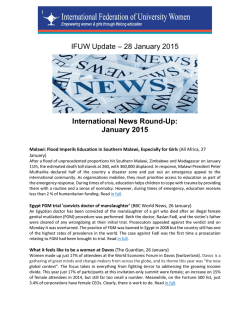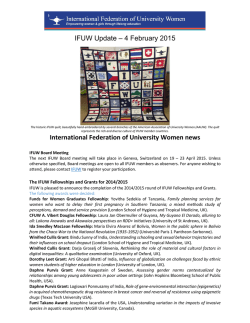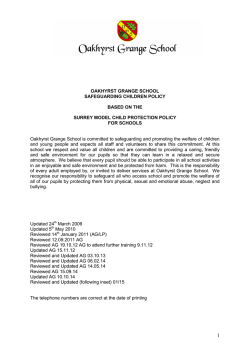
Briefing European Parliamentary Research Service
At a glance PLENARY – 5 FEBRUARY 2015 Zero tolerance for female genital mutilation The European Union is committed to working collectively to eradicate female genital mutilation (FGM) as part of broader efforts to combat all forms of violence against women and girls, and to support the efforts of its Member States in this field. However, the European Parliament is concerned that the EU's efforts are insufficient to tackle the problem, and in particular that there is a lack of concrete deadlines for EU actions. The EP is therefore continuing to push for the EU to adopt binding instruments for combating gender-based violence. Facts and figures Female genital mutilation (FGM) includes all procedures that intentionally alter or cause injury to the female genital organs for non-medical reasons. FGM is carried out for cultural, religious and/or social reasons, mostly on young girls between infancy and the age of 15. It has no health benefits and can have serious immediate and long-term effects on health and wellbeing. The World Health Organization (WHO) estimates that, worldwide, some 140 million women and girls are currently living with the consequences of FGM. The practice, which is most common in 28 African countries, is also prevalent in the Middle East (Yemen, northern Iraq) and Asia (Indonesia) and has been reported to a lesser extent elsewhere. Official EU-level statistics on the prevalence of FGM in Europe are lacking. However, a recent study conducted by the European Institute for Gender Equality (EIGE) to map FGM found that there are victims – or potential victims – in at least 13 EU countries: Austria, Belgium, Denmark, Germany, Spain, Finland, France, Ireland, Italy, the Netherlands, Portugal, Sweden and the UK. In its 2012 Resolution on ending female genital mutilation the European Parliament refers to estimates that at least 500 000 women living in the EU have been subjected to female genital mutilation and that a further 180 000 girls and women are at risk of undergoing FGM, usually during a stay in a country in which the practice is prevalent. In addition, around 20 000 women and girls from FGM-practising countries seek asylum in EU Member States every year, with an estimated 1 000 asylum claims directly related to FGM. This number has steadily increased since 2008. The European Parliament has played a particularly important role in raising awareness and pushing for firm action on violence against women and FGM in particular, including through the work of its Committee on Women's Rights and Gender Equality (FEMM), which discussed the issue of FGM with two experts on 20 January 2015. Parliament has adopted four resolutions on FGM, in 2001, 2009, 2012, and most recently in February 2014, calling on the Commission and Member States to provide the legal and other means required to raise awareness, protect and support victims and ensure that offenders are prosecuted. The UN has named 6 February the International Day of Zero Tolerance for Female Genital Mutilation, and the European Commission has committed to an annual stock-taking, around that day, of EU efforts to combat FGM. Commitments and action to combat FGM FGM constitutes a form of child abuse and gender-based violence, and is recognised internationally as a violation of the human rights of girls and women. The practice also violates a person’s rights to health, security and physical integrity; the right to be free from torture and cruel, inhuman or degrading treatment; and the right to life in cases where the procedure results in death. In order to prevent FGM and to protect FGM victims, a range of measures have been adopted at international, EU and national level. International instruments At international level, United Nations and Council of Europe standards are benchmarks in work to combat FGM. Key treaties, including the Convention on the Elimination of All Forms of Discrimination against EPRS | European Parliamentary Research Service Author: Rosamund Shreeves, Members' Research Service PE 548.971 Disclaimer and Copyright: The content of this document is the sole responsibility of the author and any opinions expressed therein do not necessarily represent the official position of the European Parliament. It is addressed to the Members and staff of the EP for their parliamentary work. Reproduction and translation for non-commercial purposes are authorised, provided the source is acknowledged and the European Parliament is given prior notice and sent a copy. © European Union, 2015. [email protected] – http://www.eprs.ep.parl.union.eu (intranet) – http://www.europarl.europa.eu/thinktank (internet) – http://epthinktank.eu (blog) EN EPRS Zero tolerance for female genital mutilation Women (CEDAW), the Convention on the Rights of the Child, and the Geneva Convention, all cover FGM indirectly, with specific guidance on protection and asylum for victims. The UN has made longstanding efforts to end the practice, culminating in its first specific resolution on female genital mutilation in December 2012. This non-binding resolution called for the adoption of national action plans and comprehensive, multi-disciplinary strategies to eliminate FGM. In the Council of Europe framework, the 2011 Convention on Preventing and Combating Violence against Women and Domestic Violence (‘Istanbul Convention’), which came into force in August 2014, is the first specific legally binding instrument in this field. More extensive than CEDAW, it creates a comprehensive framework for preventing violence, protecting victims and prosecuting perpetrators. FGM is addressed directly, in particular in Article 38. Both the European Parliament and the Council have urged Member States which have not yet done so to ratify and implement this Convention. Some 23 Member States have signed the Convention but only eight of these have as yet ratified, while the EU has not yet signed the Convention in its own right. Legislative and policy framework at European level Although the EU itself currently has no binding instrument designed to protect women from violence, relevant instruments exist in a number of areas. The principles of gender equality and non-discrimination are affirmed in the Article 2 of the Treaty on European Union and in the EU Charter of Fundamental Rights, which also guarantees the right to dignity and includes specific provisions on the right to physical and mental integrity. The Directive on Victims' Rights requires that support services be provided to victims of violence, including FGM. In relation to asylum, the Asylum Reception Conditions Directive specifically mentions victims of FGM amongst vulnerable persons who should receive appropriate healthcare during their asylum procedure, while the recast Qualification Directive includes FGM as grounds to be taken into account when granting asylum. In 2013, the Commission adopted a communication, 'Towards the elimination of female genital mutilation'. It aims to ensure that action to combat FGM is mainstreamed across the fields of justice, police, health, social services, child protection, education, immigration and asylum and external action. Areas where the Commission has promised to act include: Providing the reliable, comparable EU-level data necessary to establish the prevalence of FGM and provide a solid basis for policy, focusing on establishing common indicators as part of the EU's follow-up to the UN Beijing Platform for Action; Improving support for victims by helping Member States to develop support services for victims, and training and awareness-raising for relevant professionals, with a focus on empowering communities; Supporting Member States in prosecuting FGM more effectively; Ensuring that women at risk are protected more effectively under EU asylum rules, by ensuring proper transposition and implementation of the EU legislative framework on asylum and victim protection; Promoting the worldwide elimination of FGM, through ensuring that it is addressed in the EU's external policy and integrated in gender and child rights training for EU staff in relevant external delegations; On the question of funding, following on from the Daphne programme, funding was to be made available under the Rights, Equality and Citizenship Programme 2014‐2020, which has a maximum budget of €439.5 million for the 2014‐20 period, as well as under the Erasmus+ and Asylum and Migration Fund. In preparing its communication, the Commission drew on a public consultation and an opinion from the Advisory Committee on Equal Opportunities. Instruments against FGM at national level Many of the actions needed to end FGM lie within the competences of the Member States. FGM is now a prosecutable offence under national laws in all Member States, either as a specific criminal act or as an act of bodily harm or injury. However, very few cases are brought to court. A number of Member States have also developed national action plans on FGM. Continuing issues of concern include barriers to reporting and successful prosecution, support for victims and ensuring long-term, sustainable cultural change. Members' Research Service Page 2 of 2
© Copyright 2026




